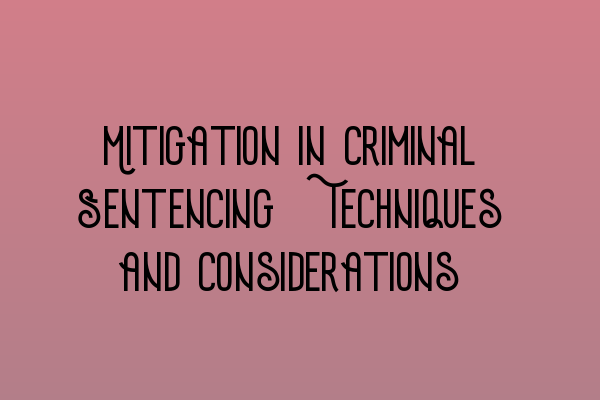Mitigation in Criminal Sentencing: Techniques and Considerations
When it comes to criminal sentencing, mitigation plays a crucial role in determining the outcome of a case. Mitigation refers to the process of presenting evidence and arguments that can help reduce the severity of the sentence imposed on an individual convicted of a crime. In this article, we will explore various techniques and considerations involved in effective mitigation strategies.
Understanding Mitigation in Criminal Sentencing
Mitigation is a legal concept that aims to provide the court with a comprehensive understanding of the circumstances surrounding the crime and the offender. It allows the court to consider factors that may justify a reduced sentence, such as the offender’s personal background, previous criminal record (if any), mental health issues, and level of remorse demonstrated.
It is important to note that effective mitigation requires careful planning and preparation. It is advisable to seek professional legal representation to ensure the best possible outcome for the defendant. Legal Representation for Delaware LLCs in the UK: Expert Advice offers valuable insights into choosing the right legal expert to handle your case.
Techniques for Effective Mitigation
1. Character references: Character references provide an opportunity to present the defendant’s positive qualities, achievements, and contributions to society. They can help humanize the defendant in the eyes of the court and demonstrate that the offense is out of character.
2. Expert testimonies: Expert testimonies can be instrumental in explaining complex psychological, medical, or forensic concepts to the court. They can help establish the presence of any mental health issues, provide insights into the defendant’s capacity for rehabilitation, and emphasize the need for alternative sentencing options.
3. Genuine remorse and rehabilitation plans: Demonstrating genuine remorse for the offense and outlining a comprehensive rehabilitation plan can positively influence the court’s perception of the defendant’s prospects for reform. It is vital to emphasize any efforts made to address underlying issues and prevent future offending.
Ensuring Ethical Business Practices: Delaware’s Code of Conduct highlights the importance of ethical conduct, which is an essential aspect of effective mitigation strategies.
Considerations in Mitigation
1. Timing and presentation: Mitigation should be strategically timed to ensure it is presented at the most appropriate stage of the criminal proceedings. It is essential to consider the court’s requirements and any procedural rules governing the presentation of mitigation evidence.
2. Tailoring the mitigation strategy: Every case is unique, and the application of mitigation techniques should be tailored accordingly. It is crucial to understand the specific circumstances of the case and identify key areas where mitigation can have the greatest impact.
UK Criminal Law: An In-Depth Analysis of the British Legal System offers valuable insights into the nuances of the legal system, which can help inform an effective mitigation strategy.
Conclusion
Mitigation plays a significant role in criminal sentencing and should be approached with careful consideration. By utilizing techniques such as character references, expert testimonies, and demonstrating genuine remorse and rehabilitation plans, defendants can improve their chances of securing a favorable outcome. Understanding the important considerations in mitigation and seeking professional legal guidance are crucial steps in navigating the complex landscape of criminal sentencing.
For more information on legal challenges faced by UK businesses, including strategies for overcoming hurdles, Legal Challenges for UK Businesses in the U.S.: Strategies for Overcoming Hurdles provides valuable insights.
